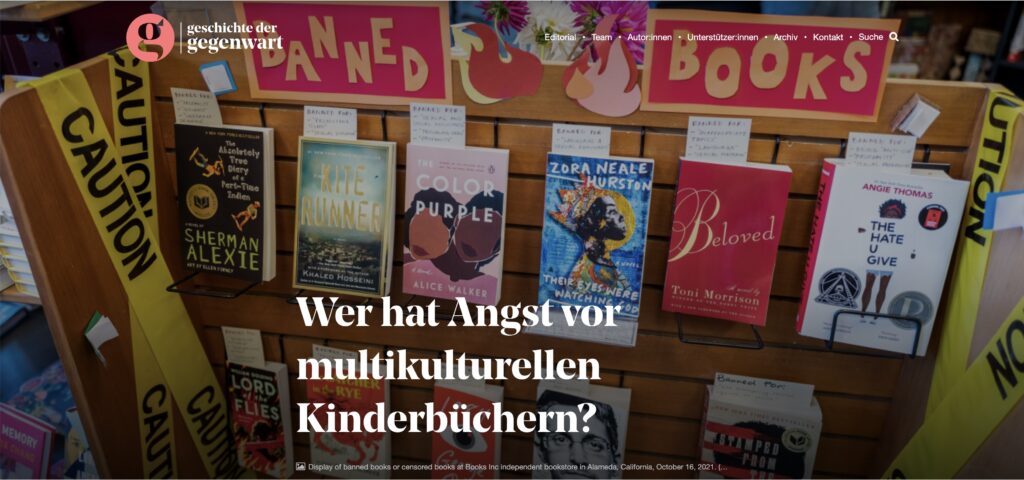Why are people afraid of multicultural children’s books? To answer that question, I look back to the roots of American censorship — which, as you doubtless know, has been enjoying a renaissance lately. My piece makes its debut today in Geschichte der Gegenwart, a Swiss publication the title of which means History of the Present. That’s an apt venue for two reasons, the first of which is that I’m doing precisely that — historicizing the present.
The second reason is that it’s being published in German.
(The original English version will follow in a few days, and I will add a link when it does.)
In general, Europeans are taking rising authoritarianism more seriously than Americans are. I could be wrong here: Although I am writing this blog post while in Denmark, I don’t live in Europe, and my insufficient knowledge may paint too rosy a picture of politics here. And, to be clear, these countries are also witnessing a rise the kind of scapegoating we’re seeing in the US — but, I think, not to the same degree, and nor with comparable underlying instability.
Because imagine, if you will, a former leader of Switzerland, Germany, or Denmark inciting a violent coup two years ago — a coup resulting in the deaths of nine people (five on that day, four in next seven months) and the injury of over 100 police officers. Would that leader be eligible for office, and currently running for president / chancellor / prime minister? Or would that leader be barred from office and serving time in prison for their crimes?
If you want a preview of the English-language version (or simply would like to hear an illustrated talk), the article derives from a talk I gave on February 27. Here is the video.
The video has been available on YouTube since then, but… only if you had the link.
That was a mistake on my part — preemptive soft censorship, done in anticipation of attacks from America’s rising (and well-armed) fascist right. I made a failed compromise between speaking out and staying safe.
However, the fight against fascism requires that we use our voices and the power we have — while we still have it. So, three months later, I’m correcting my error.
Finally, some may bristle at my use of the word “fascism” to describe America’s Republican Party and its allies. But there’s a term for groups who ban degenerate art, scapegoat minority groups, spread misinformation, and threaten violence against those who oppose them. That term is “fascist.” American fascism in the 2020s may not be identical to German fascism in the 1930s, but we need to speak plainly. The Republican Party, Fox “News,” Moms for Liberty, etc. are fascist groups.
I understand why people may be hesitant to use the word. Fascists don’t like to be called fascists. Bullies don’t like to be called out for their bullying. They try to silence their critics with more bullying — and, in the contemporary US, with violence.
Fascism is a real danger in the US — see, for instance, what the Washington Post has called Trump’s “authoritarian vision for his second term.” And silence is never an effective defense against fascism.
Speaking up doesn’t guarantee success either, of course. But it’s the better choice.

